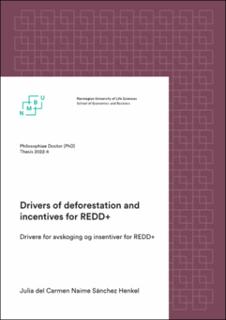| dc.contributor.advisor | Angelsen, Arild | |
| dc.contributor.advisor | Alfnes, Frode | |
| dc.contributor.author | Naime Sánchez Henkel, Julia del Carmen | |
| dc.date.accessioned | 2023-03-16T10:27:00Z | |
| dc.date.available | 2023-03-16T10:27:00Z | |
| dc.date.issued | 2022 | |
| dc.identifier.isbn | 978-82-575-1881-3 | |
| dc.identifier.issn | 1894-6402 | |
| dc.identifier.uri | https://hdl.handle.net/11250/3058698 | |
| dc.description.abstract | Tropical deforestation is a global environmental and development problem. Identifying
policies that effectively reduce deforestation while improving rural livelihoods is
essential to meet our climate and sustainable development goals. The thesis has two main
objectives: first, to evaluate the potential of collective Payments for Ecosystem Services
(PES) to deliver on conservation and development outcomes under different contexts, and
second, to improve our understanding of the causes of deforestation at the national level.
Paper I and II investigate the central question of how to solve the free rider problem of
collective PES, using data from a framed field experiment in Brazil, Indonesia and Peru.
They examine three strategies to mitigate the free-rider problem: (i) increase in public
monitoring of individual actions, (ii) peer-to-peer, community sanctions, and (iii)
external, government sanctions. Overall, public monitoring and both types of sanctions
increase policy effectiveness. Government sanctions are the most effective to reduce
deforestation; community or peer-to-peer sanctions also reduce deforestation but can
create trade-offs in terms of loss of local income. There are also important cross-country
differences in policy impact. Increased public monitoring does not improve the
performance of collective PES in Brazil, while in Indonesia peer-to-peer sanctions are
much more frequent. In Indonesia, the existence of inequality in wealth reduces the
performance of collective PES, while it has negligeable impacts in Peru and Brazil. In
general, individuals who contribute more to conservation outcomes are also the ones who
contribute more to the enforcement of conservation norms by sanctioning free-riders.
Paper III presents a household-level impact evaluation of two collective PES schemes in
Ucayali, Peru. The first is a local conservation project led by an NGO while the second is
the Peruvian's government National Forest Conservation Program (NFCP). The paper
examines land use, income, and wellbeing outcomes. The projects have not improved
local incomes because of a slow and delayed implementation. The delayed and slow
implementation have not, in turn, negatively affected forest or conservation outcomes.
The study brings forward the importance of considering households' subjective
wellbeing impacts of conservation projects.
Taken together, the results of Paper I, II and III point to the importance of having good
forest monitoring to improve conservation, development, and wellbeing outcomes of
collective PES.
Paper IV addresses the second objective of the thesis by examining how dual economy
growth models can help understand patterns of deforestation across countries. The paper
develops a theoretical framework to disentangle the immediate drivers of deforestation
from the indirect drivers. The results are consistent with economic predictions: competing
land use value between forest and agriculture are a major immediate driver of
deforestation. There is suggestive evidence that openness to trade can, indirectly, reduce
deforestation levels by decreasing the relative return of agricultural land. | en_US |
| dc.description.abstract | Tropisk avskoging er et globalt miljø- og utviklingsproblem. Redusert avskoging og forbedring av levebrødet på landsbygda er avgjørende for å oppfylle mål for reduserte klimaendringer og bærekraftig utvikling. Avhandlingen har to hovedmål: for det første å evaluere effekten av politikk som tar sikte på å redusere avskoging og forbedre levebrødet på landsbygda, med et fokus på kollektive betalinger for økosystemtjenester
(PES), og for det andre å forbedre vår forståelse av årsakene til avskoging. | en_US |
| dc.description.sponsorship | CRP-FTA CGIAR Fund Donors | en_US |
| dc.language.iso | eng | en_US |
| dc.publisher | Norwegian University of Life Sciences, Ås | en_US |
| dc.relation.ispartofseries | PhD Thesis;2022:4 | |
| dc.rights | Attribution-NonCommercial-NoDerivatives 4.0 Internasjonal | * |
| dc.rights.uri | http://creativecommons.org/licenses/by-nc-nd/4.0/deed.no | * |
| dc.subject | Deforestation | en_US |
| dc.subject | Behavioural economics | en_US |
| dc.subject | Development economics | en_US |
| dc.subject | Payments for ecosystem services | en_US |
| dc.subject | PES | en_US |
| dc.title | Drivers of deforestation and incentives for REDD+ | en_US |
| dc.title.alternative | Drivere for avskoging og insentiver for REDD+ | en_US |
| dc.type | Doctoral thesis | en_US |
| dc.relation.project | Norad: QZA-16/0110 | en_US |
| dc.relation.project | Norad: QZA-21/0124 | en_US |
| dc.relation.project | International Climate Initiative (IKI) of the German Federal Ministry for the Environment, Nature Conservation, and Nuclear Safety (BMU): . 20_III_108 | en_US |

